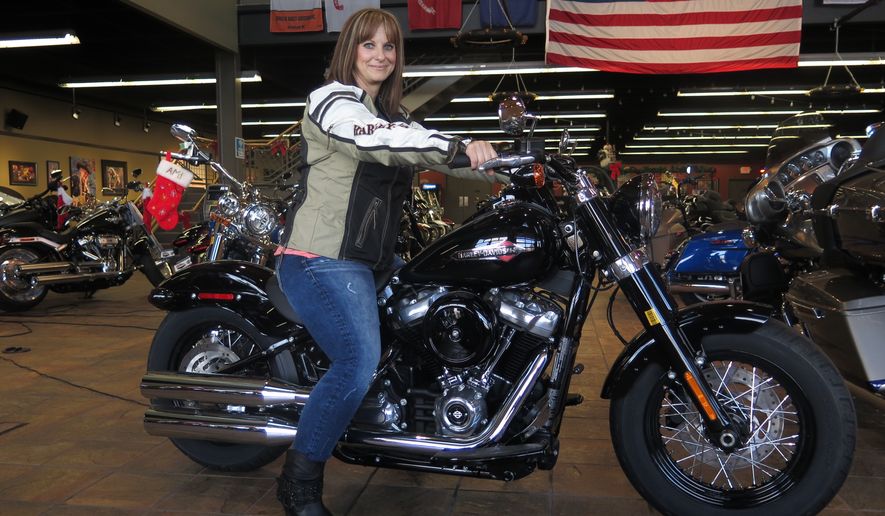President Trump said Tuesday that motorcycle manufacturer Harley-Davidson is angering its famously loyal U.S. customers by moving some production facilities to Europe, and accused the company of using the administration’s tariff feud with the European Union “as an excuse” for the move.
Criticizing the manufacturer for the second straight day on social media and in comments to reporters, Mr. Trump also warned Harley-Davidson that moving some of its production overseas would mark “the beginning of the end” for the iconic American brand.
“Harley Davidson is using [tariffs] as an excuse and I don’t like that because I’ve been very good to Harley Davidson,” Mr. Trump said during a meeting with lawmakers at the White House. “And I think that the people that ride Harleys are not happy with Harley Davidson, and I wouldn’t be, either.”
The company said it will move some of its manufacturing operations to Europe due to the EU raising tariffs on U.S.-built motorcycles from 6 percent to 31 percent, a retaliation for Mr. Trump’s tariff’s on EU steel and aluminum.
Investors, farmers and business leaders are worried about the impact of more U.S. tariffs due to kick in soon, but Mr. Trump said the economy is strong enough to withstand a temporary trade war with countries such as China, Canada and Mexico. He insisted that his strategy is bringing other countries to the bargaining table to reduce long-standing trade barriers against the U.S.
“It’s up almost 40 percent, the [stock] market,” Mr. Trump said. “Now, we’ve got a little bit of uncertainty because of trade. To me, there’s no uncertainty. But we can’t allow the European Union to take out $151 billion out of the United States. It’s a tremendous amount of money being taken out of our economy, and we have to straighten it out. Other countries are negotiating. And without tariffs, you could never do that.”
Despite the jitters over tariffs, U.S. stocks traded higher Tuesday as oil prices rallied and technology and industrial companies bounced back from Monday’s losses.
Mr. Trump also signaled that he may take a less confrontational approach toward limiting Chinese investments in what he calls “crown jewel” American technologies, saying he is leaning toward relying on a U.S. committee that reviews foreign acquisitions for national-security risks. Treasury Secretary Steven T. Mnuchin also favors using the Committee on Foreign Investment in the U.S., instead of the more aggressive approach of declaring an economic emergency and invoking an obscure law called the International Emergency Economic Powers Act of 1977.
“We have the greatest technology in the world. People copy it and they steal it,” Mr. Trump said. “We have to protect that and we’re going to protect it. And that’s what we were doing, and that can be done through CFIUS.”
Lawrence Ward, a specialist in national-security law and trade compliance at the law firm Dorsey & Whitney, said trade sanctions under IEEPA generally take a “blanket-prohibition” approach to the sanctioned party and would be a “monumental” step.
“The fact remains that the CFIUS review and investigation process has worked well to protect U.S. national security while still allowing foreign direct investment when it makes good business sense to the U.S. seller and the foreign buyer,” he said.
U.S. and Chinese tariffs are due to take effect on July 6 on a variety of products; the EU tariffs on U.S. motorcycles, bourbon and other goods kicked in on Friday.
Harley-Davidson said the tariffs will cost the company up to $100 million annually in profits, adding $2,200 to the cost of a motorcycle produced in the U.S. and sold in Europe. Therefore, it said in a regulatory filing, it had no choice but to start manufacturing some bikes in Europe, its second-biggest market.
The Milwaukee-based company has been building plants overseas since 1999, when it opened a facility in Brazil. It opened a plant in India in 2011, and announced in 2017 it would build a plant in Thailand, after Mr. Trump pulled out of the Trans-Pacific Partnership free-trade agreement negotiated by President Barack Obama.
On Twitter, Mr. Trump said Harley-Davidson had planned its move before the tariff feud erupted, and that the company won’t be able to sell motorcycles back to the U.S. “without paying a big tax!”
“A Harley-Davidson should never be built in another country-never!” Mr. Trump tweeted. “Their employees and customers are already very angry at them. If they move, watch, it will be the beginning of the end — they surrendered, they quit! The Aura will be gone and they will be taxed like never before!”
The U.S. accounts for 147,972 of the company’s retail sales in 2017, and Europe accounted for 39,773.
Robert Martinez Jr., the president of the International Association of Machinists and Aerospace Workers, accused the company’s latest choice of being just one in a long line of moves overseas. He pointed to the company’s facilities in India and Brazil and plans for production in Thailand, which Mr. Trump tweeted about on Tuesday.
“Harley-Davidson’s announcement today is the latest slap in the face to the loyal, highly-skilled workforce that made Harley an iconic American brand,” Mr. Martinez said in a statement. “Will Harley use any excuse to ship jobs overseas? Does Harley even understand what ’Made in America means’?”
The president insisted that his tariff feuds are already producing results, with growth in the domestic steel industry, as well as increasing production of solar panels and washing machines.
“The bottom line is countries are coming back now to negotiate, including European Union wants to negotiate,” Mr. Trump told reporters. “Nobody knows what’s happening behind the scenes.”
• Dave Boyer can be reached at dboyer@washingtontimes.com.
• Gabriella Muñoz can be reached at gmunoz@washingtontimes.com.




Please read our comment policy before commenting.